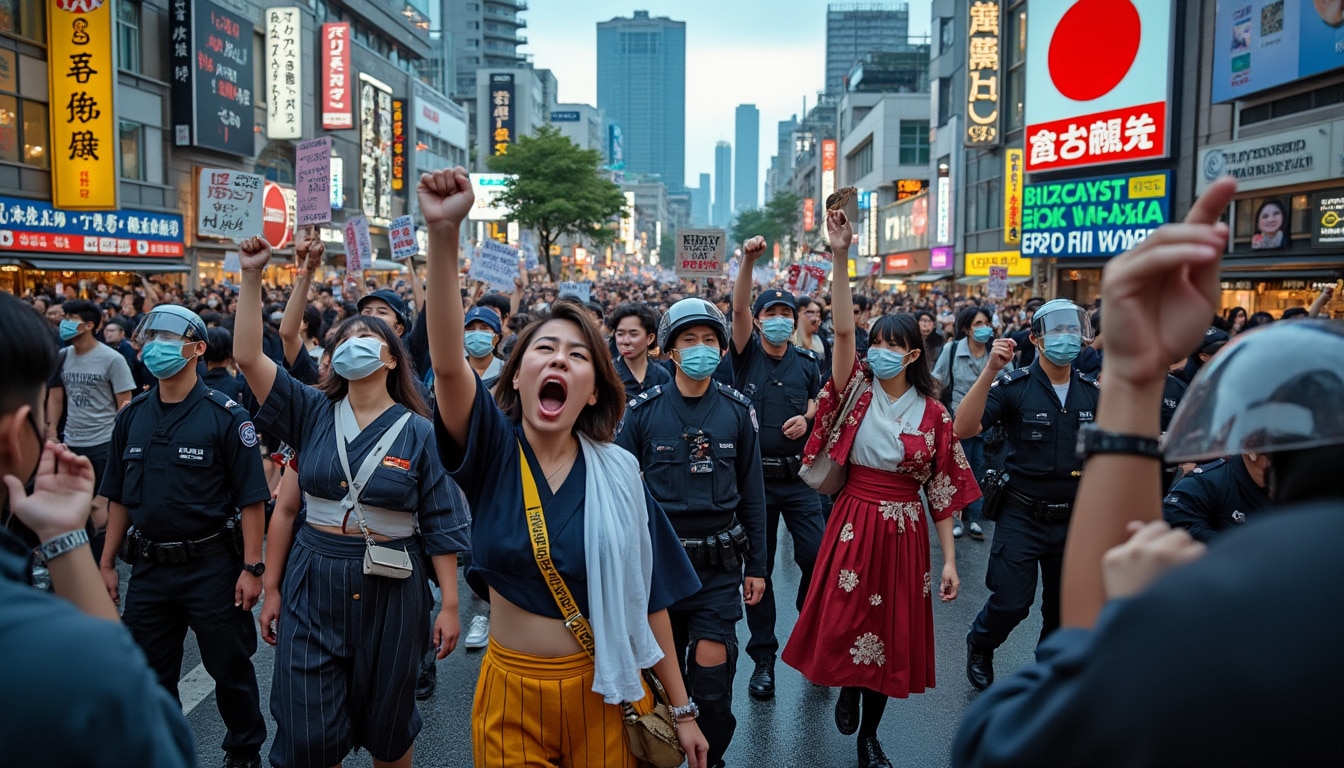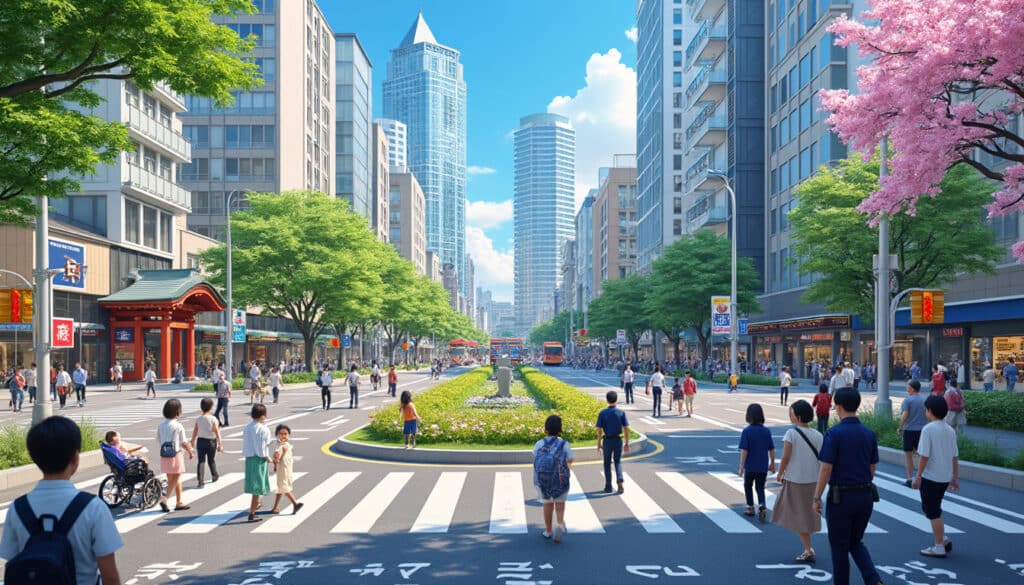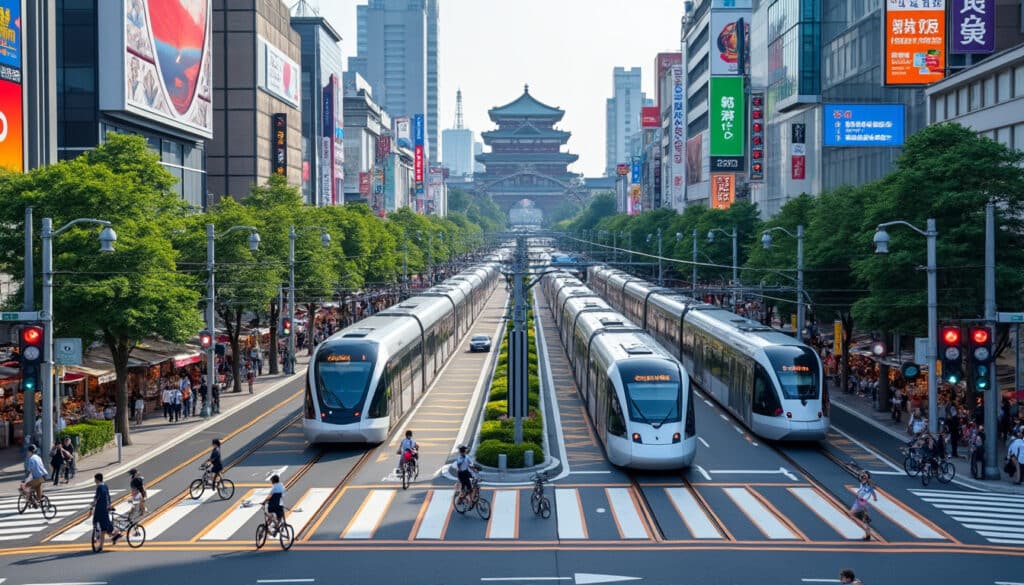Osaka, a vibrant city known for its culinary delights and dynamic culture, has recently found itself at the epicenter of political and social tensions. The bustling streets that are usually filled with tourists sampling street food and locals engaging in cultural festivities have been transformed by waves of protests highlighting various issues such as social inequality, forced evictions, and international solidarity movements. From the plight of homeless individuals in the city’s Nishinari Ward to rallies against international conflicts, Osaka’s social landscape has become a testament to the increasing awareness and activism of its residents. The following sections delve into the multifaceted nature of these protests, offering insights into the reasons behind these movements and their implications for the future of urban life in this iconic city.
Forced Evictions in Nishinari Ward: A Catalyst for Unrest
The Nishinari Ward of Osaka has long been known as a hub for day laborers, a community deeply embedded in the history and economy of the area. However, recent actions by Osaka’s prefectural authorities have brought this neighborhood into the spotlight for less than favorable reasons. The enforcement of eviction orders at the former labor welfare center has sparked significant unrest, drawing attention to the plight of the homeless and the broader issue of urban gentrification in the city.
The eviction process commenced early on a Sunday morning, with court officials and Osaka Prefectural Police instructing individuals who had set up makeshift shelters around the erstwhile welfare center to vacate the premises. The scene quickly escalated as supporters of the homeless community clashed with police at barricades that had been hastily erected to maintain order. The tension was palpable, with vocal advocates taking a stand, including a man using a megaphone to vocalize the grievances of the displaced, poignantly stating, “Day laborers live here. This city is built on the money that they spend.”
This center, established in 1970 and serving as a linchpin for welfare support and job placement, was shut down in 2019 over safety concerns regarding its earthquake resilience. Since its closure, the surrounding area has become a refuge for those without homes, creating community amid adversity. The subsequent legal battle culminated in a Supreme Court decision in May that upheld previous rulings, finalizing the eviction order. This legal victory for the prefecture, however, was seen as a defeat for the community, igniting protests.
- 🏠 The historical significance of the labor center.
- 🏙 Impact of gentrification and modern urban policies.
- 🔊 Vocal protests highlighting human rights issues.
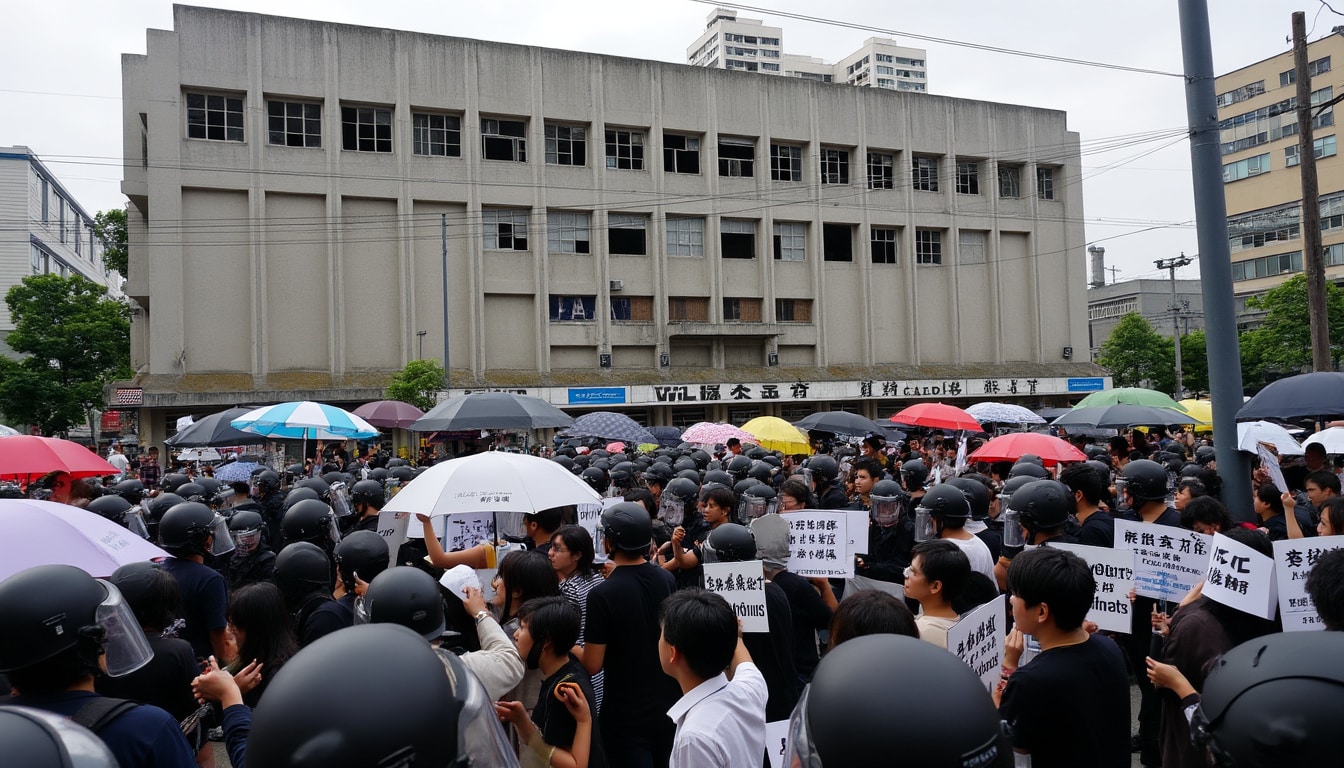
The protests in Nishinari Ward exemplify the struggle between development and community rights, a universal issue in many urban centers around the globe. Organizations such as Human Rights Watch and Amnesty International have shown increasing interest in these developments, emphasizing the need for humane solutions that prioritize the welfare of all city dwellers. This confrontation not only highlights the socio-economic divide but also raises crucial questions about the direction in which urban development is heading. Can cities like Osaka balance sustainable growth with the rights and needs of their most vulnerable populations?
The Role of Advocacy and International Attention
Amidst the turmoil in Osaka, advocacy groups play a pivotal role in amplifying voices that might otherwise go unheard. Domestic and international organizations have turned their focus to the city’s protests, bringing global attention to the issues at hand. Groups such as the International Federation for Human Rights and Freedom House have advocated for transparency and accountability in the eviction processes, urging local administrations to adopt more inclusive policies.
The increased spotlight on these issues has also sparked discussions in the realm of international human rights, with agencies like Civil Rights Corps and StopAAPIHate addressing the systemic challenges faced by marginalized communities. This global attention not only strengthens local advocacy efforts but also opens dialogues that could pave the way for policy changes. While the immediate focus remains on resolving the current predicament, these discussions are crucial for long-term, sustainable urban strategies that align with the idea of building Sustainable Cities for the future.
| Organization | Focus | Impact |
|---|---|---|
| Human Rights Watch | Eviction policies | Advocacy for humane solutions |
| Amnesty International | Human rights violations | Pressure on local governments |
| Civil Rights Corps | Social justice advocacy | Raising awareness |
Standing with Myanmar: Osaka’s International Solidarity
In a show of international solidarity, Osaka has also become a key location for protests against political unrest in Myanmar. As the city’s diverse population rallies for causes that transcend borders, the events surrounding the Myanmar military coup have found resonance among Osaka’s residents. This movement not only amplifies the voices of Myanmar nationals in Japan but also underscores Osaka’s role as a center of global activism.
On the recent anniversary of the 2021 military coup in Myanmar, hundreds of people, including workers and students, gathered in front of the Myanmar Embassy in Tokyo and Okinawa to mark the occasion. Demonstrators wielded placards and banners, calling for justice and democratic reforms. Chants of “Release our leader” and “We will win” reverberated through the streets, echoing the resilient spirit of those opposed to military rule.
- ✊ Unified global movements in support of Myanmar.
- 🌐 Cross-cultural advocacy and awareness campaigns.
- 📣 Amplification of marginalized voices on an international stage.
This protest, characterized by a large turnout, saw participants engage in symbolic acts of resistance, such as flashing the three-finger salute, a universal gesture of defiance and solidarity. Many of those gathered had personal connections to the conflict, recounting stories of family members affected by the unrest, thereby humanizing the struggle to the broader Japanese public.
Notably, the focus on Myanmar has drawn support from organizations like Asian Americans Advancing Justice, which emphasizes the power of community building and identifies shared struggles among diverse groups. By fostering a united front, these collaborative efforts highlight the importance of international cooperation in addressing global challenges.
Osaka as a Hub for Global Activism
Through these acts of solidarity, Osaka emerges not just as a local center for social justice, but as a focal point for international activism. The city’s protests serve as reminders that the struggles faced by individuals are part of a larger, interconnected narrative of human rights and democracy. These movements are bolstered by social media networks, enabling rapid dissemination of information and mobilization
This interconnectedness is further enhanced by platforms like Twitter and Instagram, where images and stories from protests reach global audiences. As these issues gain traction online, they inspire a wider range of people to engage with and support the causes being championed. Herein lies the transformative power of modern activism — the ability to transcend geographical boundaries through digital communication, rallying individuals across the globe to fight for a common cause.
| Event | Date | Location |
|---|---|---|
| Anniversary of Myanmar Coup Protest | February 1, 2025 | Osaka, Tokyo |
| Protest Against Evictions | Ongoing | Nishinari Ward, Osaka |
Osaka’s Socio-Political Landscape in 2025
The year 2025 has seen Osaka positioned at the forefront of various social and political movements. The city’s response to local and international issues showcases its dynamic spirit and the resilience of its communities. From advocating for the homeless to engaging in international solidarity movements, Osaka remains committed to addressing pivotal issues through sustained activism and advocacy.
The interactions between local governance, civic organizations, and international entities highlight the complex web of relationships that influence urban policy. This interplay is key to understanding the broader implications of protests and social movements, providing insights into how cities can evolve to meet the changing needs of their inhabitants.
- 🔍 Understanding the drivers of social unrest.
- 🏙 The role of local and international organizations in advocacy.
- 🌍 Global influences shaping local movements.
Undoubtedly, the protests in Osaka reflect a microcosm of broader societal tensions that resonate across other metropolitan regions. They serve as a powerful reminder of the ongoing struggle for equity and justice and reinforce the idea that progress requires both local efforts and global perspectives. As Osaka continues to navigate these challenges, the city’s actions and outcomes set a precedent for other urban centers grappling with similar issues.
The Future of Protest and Social Change in Osaka
Looking ahead, the future of protests and social change in Osaka is closely tied to the broader trends in civil society engagement. The combination of local activism and international awareness sets the stage for impactful change, fostering a culture of inclusivity and resilience. As more individuals and organizations come together to address pressing issues, Osaka’s role as a leader in social justice movements will likely continue to grow.
The ongoing dialogue concerning human rights and social justice is central to shaping policies that advocate for environmental sustainability, economic fairness, and equitable urban development. This continuous process of engagement ensures that Osaka evolves as a Sustainable City, balancing growth with the needs and rights of all its residents.
FAQ: Understanding Protests and Social Unrest in Osaka
- What are the main causes of social unrest in Osaka?
- How is the international community involved in Osaka’s protests?
- What role does social media play in these protests?
- Who are the key players in Osaka’s protests?
- What impact do these protests have on urban policy?
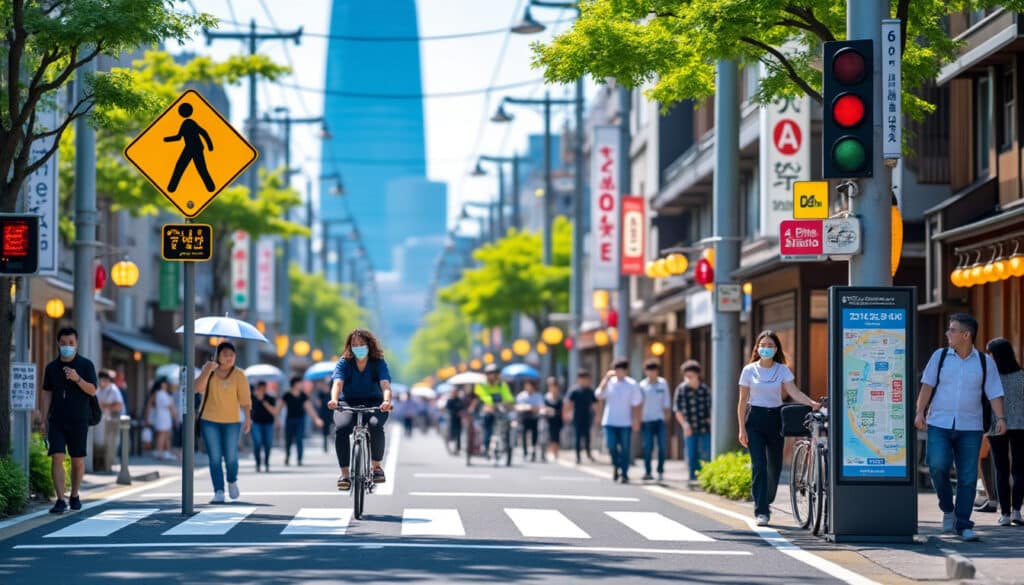
As you plan your visit to the vibrant city of Osaka, home to neon lights, delicious street food, and a rich cultural atmosphere, it’s vital to prioritize your safety. While Osaka is generally a secure place, being well-informed about specific…
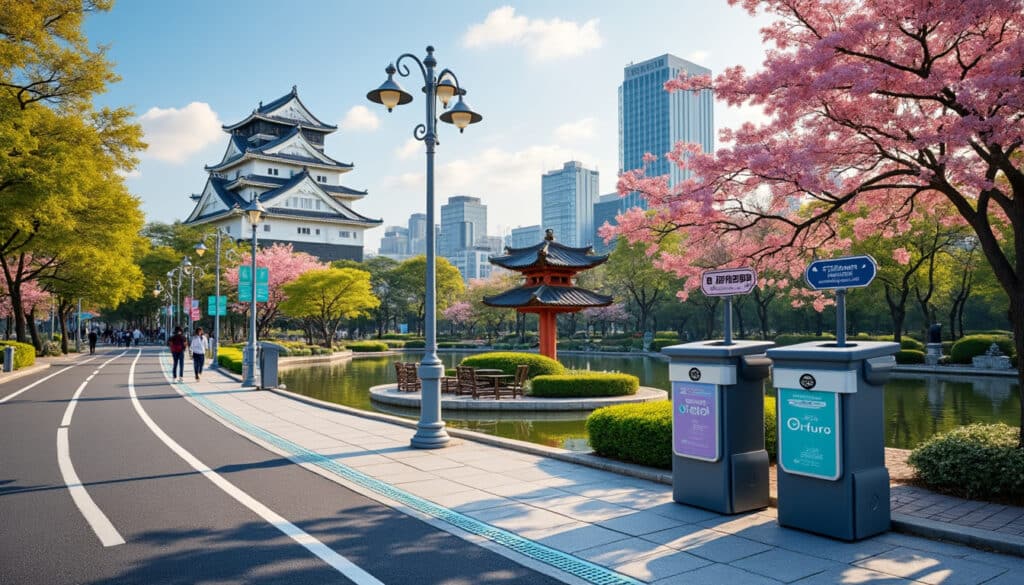
Cleanliness and hygiene in Osaka
Osaka, a city renowned for its vibrant atmosphere and captivating street life, is equally celebrated for its rigorous standards of cleanliness and hygiene. While the bustling food stalls and crowded urban scenes might suggest chaos, Osaka’s commitment to sanitation is…

Pickpocketing and theft in Osaka
Osaka, often recognized for its culinary delights and vibrant pop culture, is a bustling metropolis that draws millions of visitors each year. Despite its reputation as one of the safest cities in the world, like any major urban center, it…
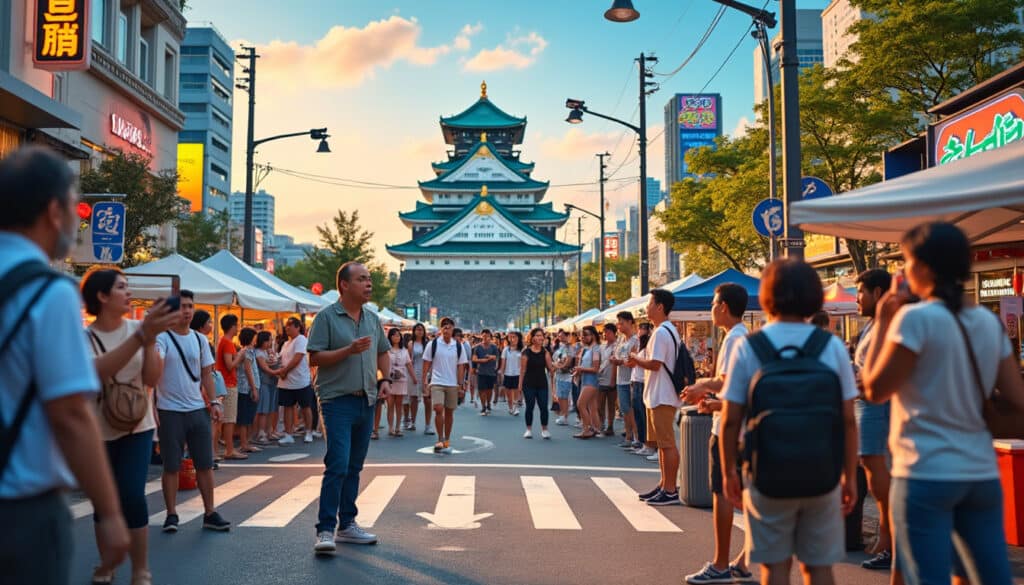
Safety in Osaka for travelers from different countries
Osaka, a bustling metropolis known for its rich culture, delectable street food, and vibrant nightlife, has long been a favorite destination for travelers from around the world. But with its rapid growth and modernization, many travelers often wonder: Is Osaka…

